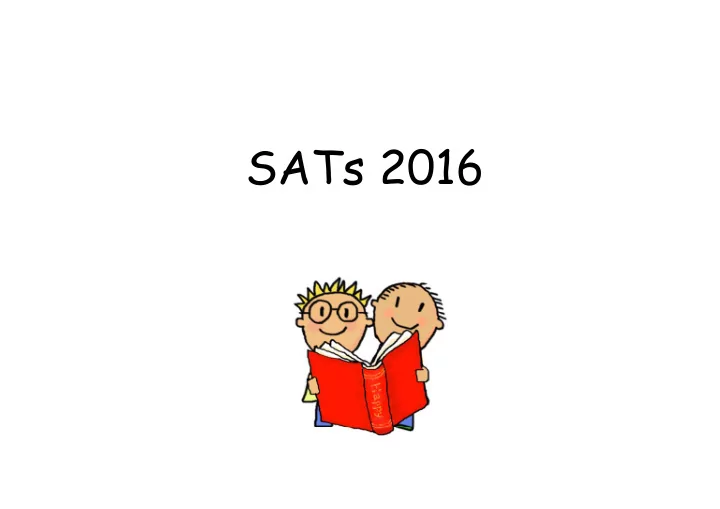

SATs 2016
Why do we have SATs? Why do we have SATs? • SATs are used to monitor the school’s progress • SATs are used to monitor the children’s progress SATs are used to monitor the children s progress • To assess whether children are working at the expected standard for the end of KS1 p f f • The tests make up part of the Teacher Assessment we make. This also takes account of the work the children produce in lessons. • Unlike previous years the children will not receive a level. l l • You will be told whether they have met the expected standard for their age expected standard for their age.
SATs SATs The tests will be taken towards the end of this half term. We do not tell the children when they will be as we do it as part of our everyday lessons. We try to make them as informal as possible and certainly don’t use the word SATs with them. Although guidance is given on the timing there is no official time limit We will give the children the time they need limit. We will give the children the time they need. Some children will take them in smaller groups or on a 1:1 basis. p
What will they be assessed in? What will they be assessed in? Reading Reading Writing (Spelling, Punctuation and Grammar) M th Mathematics ti Science The tests have been changed this year so that The tests have been changed this year so that they are in line with the new Curriculum. We will still be using the Spelling, Punctuation & G Grammar test to give some evidence towards mm t st t i s m id t ds elements of writing.
Example of the p Reading – paper 1
Example of Reading – paper 2 Example of Reading – paper 2
The skills tested in the Reading papers The skills tested in the Reading papers Retrieval – these require them to find information in the text Inference – use clues from the text to answer questions Ordering identify and explain the sequence of Ordering – identify and explain the sequence of events Identifying key aspects – e.g. titles, labels, Ident fy ng key aspects e.g. t tles, labels, characters Understanding word meaning – using the vocabulary to help understand the text h l d d h Predicting – using what they have read so far
Spelling, Punctuation and p g Grammar – Paper 1
Spelling, Punctuation and p g Grammar – Paper 2
Spelling Test Spelling Test • The words are read to the children. h h h l • They are then put into the sentence They are then put into the sentence. • The children are allowed to write on the edge of the page to try out the spelling. d f th t t t th lli • Handwriting is important in this test Han wr t ng s mportant n th s t st because if it can be clearly read it will be marked wrong be marked wrong.
Maths – Arithmetic paper Maths – Arithmetic paper
Maths – Reasoning paper Maths – Reasoning paper
Maths – Paper 2 Maths – Paper 2
Maths Papers Maths Papers • The children are no longer allowed h h l l ll equipment such as number lines and q p numicon • They are encouraged to write and draw • They are encouraged to write and draw pictures on the page to help them.
What about writing and Science? What about writing and Science? The children no longer sit a writing test. Instead the children will be given a teacher assessment for writing. Evidence for this is gathered throughout the year. Science is based solely on teacher assessment using evidence gathered in the classroom. id th d i th l ss
What can you do to help your y p y child? • Help your child with their homework H l hild ith th i h k • If there’s anything they’re finding hard, let us know • Work on any areas they are struggling with at y y gg g home
What we are doing? What we are doing? • We provide additional support for children p pp who haven’t met specific objectives. • We show children the types of questions they will be expected to answer during our normal p g lessons. • By the time they take the test we will have covered all the elements in the curriculum which will be assessed.
Feel free to pop in and ask any F l f i d k questions that you may have questions that you may have.
Recommend
More recommend